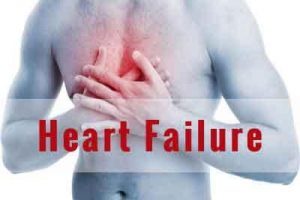- Home
- Editorial
- News
- Practice Guidelines
- Anesthesiology Guidelines
- Cancer Guidelines
- Cardiac Sciences Guidelines
- Critical Care Guidelines
- Dentistry Guidelines
- Dermatology Guidelines
- Diabetes and Endo Guidelines
- Diagnostics Guidelines
- ENT Guidelines
- Featured Practice Guidelines
- Gastroenterology Guidelines
- Geriatrics Guidelines
- Medicine Guidelines
- Nephrology Guidelines
- Neurosciences Guidelines
- Obs and Gynae Guidelines
- Ophthalmology Guidelines
- Orthopaedics Guidelines
- Paediatrics Guidelines
- Psychiatry Guidelines
- Pulmonology Guidelines
- Radiology Guidelines
- Surgery Guidelines
- Urology Guidelines
Sacubitril–valsartan therapy -New standard care for acute heart failure

The initiation of sacubitril–valsartan therapy -- a drug therapy used for patients with chronic heart failure -- improved markers of poor prognosis in patients hospitalized for acute decompensated HF, shows a new study.
The findings, published in the New England Journal of Medicine and presented at the American Heart Association Scientific Sessions in Chicago, suggest that the drug can improve outcomes for acutely ill heart patients and potentially become the new standard of care for treating this serious condition.
Acute HF, a condition in which the heart fails to pump blood efficiently, is the leading cause of hospitalizations for older adults. Affected individuals experience high rates of re-hospitalization and death. The standard of care, which consists of diuretics and medications that enhance blood flow, has remained largely unchanged for decades.
Also Read: Alpha blockers lower mortality in Heart Failure: JACC
Eric J. Velazquez, the Berliner Professor of Cardiology at Yale School of Medicine, and colleagues conducted the study to test whether the FDA-approved drug sacubitril-valsartan could improve outcomes for individuals with acute HF.
For the purpose, the research team conducted a randomized, double-blind clinical trial called PIONEER-HF. More than 800 patients hospitalized with heart failure at 129 U.S. sites were treated with either sacubitril-valsartan or the standard therapy, enalapril, an ACE inhibitor. Over the trial period of eight weeks, the researchers monitored participants' blood pressure and other safety parameters, such as kidney function, and analyzed blood and urine samples.
Also Read: Different RA medicines have varied heart failure risk
Key Findings:
- In patients taking sacubitril-valsartan, levels of a key measure of heart failure severity -- NT-proBNP (N-terminal pro–B-type natriuretic peptide) -- reduced more quickly than with the standard therapy.
- The greater reduction in the NT-proBNP concentration with sacubitril–valsartan than with enalapril was evident as early as week 1.
- The rates of worsening renal function, hyperkalemia, symptomatic hypotension, and angioedema did not differ significantly between the two groups.
"It worked to reduce NT-proBNP rapidly and to a greater extent than enalapril," said Velazquez. "There were multiple markers including troponin T, a marker of heart cell injury, that suggested substantial improvement."
Velazquez and his co-authors also reported no significant differences between the two therapies in terms of safety, including the impact on renal function, blood pressure, and other indicators. "The results of this landmark study should help inform our basic approach to treating hospitalized patients with acute heart failure," said Velazquez. "Once acute heart failure is diagnosed, patients are stabilized, and a low ejection fraction is confirmed, sacubitril/valsartan should be started promptly to reduce NT-proBNP and reduce the risk of post-discharge heart failure hospitalization."
Combined with results of a previous trial, PARADIGM-HF, which showed the drug's effectiveness for patients with chronic heart failure, these findings could make sacubitril-valsartan the go-to standard of care for acute and chronic heart failure, said the researchers.
"There are consistent results from both trials," Velazquez said. "It is safe and there's a rapid outcome. If it becomes the standard, we are likely to reduce the risk of hospitalization for heart failure, and that will have a positive clinical impact and societal impact."

Disclaimer: This site is primarily intended for healthcare professionals. Any content/information on this website does not replace the advice of medical and/or health professionals and should not be construed as medical/diagnostic advice/endorsement or prescription. Use of this site is subject to our terms of use, privacy policy, advertisement policy. © 2020 Minerva Medical Treatment Pvt Ltd